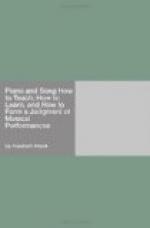Cruel fate that invented the pedal! I mean the pedal which raises the dampers on the piano. A grand acquisition, indeed, for modern times! Good heavens! Our piano performers must have lost their sense of hearing! What is all this growling and buzzing? Alas, it is only the groaning of the wretched piano-forte, upon which one of the modern virtuosos, with a heavy beard and long hanging locks, whose hearing has deserted him, is blustering away on a bravoura piece, with the pedal incessantly raised,—with inward satisfaction and vain self-assertion! Truly time brings into use a great deal that is far from beautiful: does, then, this raging piano revolutionist think it beautiful to bring the pedal into use at every bar? Unhappy delusion.
But enough of this serious jesting. Hummel never used the pedal. He was an extremist; and, in his graceful, clear, elegant, neat, though not grand playing, often lost fine effects, which would have been produced by the correct and judicious use of the pedal; particularly on the instruments of Stein, Brodmann, Conrad Graff, and others then in use, which were usually lightly leathered, and had a thin, sharp tone. The use of the pedal, of course always allowing it to fall frequently with precision, was especially desirable in the upper treble, in cases where the changes of the harmony were not very frequent; for the tone of those instruments, although sweet and agreeable, had not much depth, and the action had but little strength and elasticity. But on our instruments, frequently too softly leathered, which have a full tone, and are so strong and penetrating, especially in the bass, it is enough to endanger one’s sense of hearing to be subjected to such a senseless, incessant, ridiculous, deafening use of the pedal; frequently, moreover, combined with a hard, stiff touch, and an unsound, incorrect technique. A musical interpretation in any degree tolerable is out of the question. You cannot call that art, it cannot even be called manual labor: it is a freak of insanity!
A few words to the better sort of players. The foot-piece to the right on the piano-forte raises the dampers, and in that way makes the tones resound and sing, and takes from them the dryness, shortness, and want of fulness, which is always the objection to the piano-forte, especially to those of the earlier construction. This is certainly an advantage; the more the tone of the piano-forte resembles singing, the more beautiful it is. But, in order not to injure the distinctness and detract from the clear phrasing of the performance, a very skilful and prudent use of the pedal is necessary in rapid changes of harmony, particularly in the middle and lower portion of the instrument.




